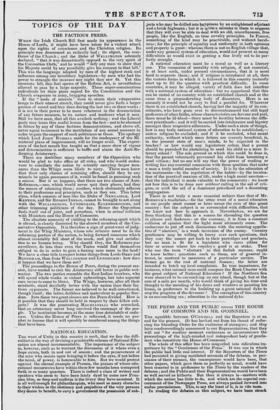NATIONAL EDUCATION.
THE-want of Units- in this country is such, that we fear the diffi- culties in the way of devising a practicable scheme of National Edu- cation are almost insurmountable. The importance of the subject is, however, such as to warrant the discussion of it where even a ,hope exists both in and out of season - and the perseverance of the man who insists upon bringing it before the eyes, if not before the mind, of power, is honourable to him. But we would protest against • the eternal example of Prussia, the praises of whose edu- cational manceuvres have within these few 'months been trumpeted -forth in so many quarters. There is indeed a class of writers and speakers who seem to have been lately dyed by some new Prus- sian blue, so deep and uniform is the livery they have assumed. It is all well enough for philanthropists, who meet so many obstacles to their wishes in the obstinacy and prejudices of the very persons they -desire to benefit, to envy a government the possession of sub- jects who may be drilled into hsppiness by an enlightened adjutaat and a brisk fugleman i • but it is write a mistake in them to suppose • that they will ever be able to deal -with an old, miscellaneous, free people, like the English, on true cavalry principles. In France, something of the kind may be practicable, and without harsh- ness; for the principle of equality and uniformity in both opinions and property is great: whereas there is not an English village that, under any general system of education, would not present as many difficulties as would exist in getting a fine lively eel to lie per- fectly straight.
A national education must be a moral as well as a literary one. The connexion of morality with religion, if not essential, is at least such, under present circumstances, that it is most hard to separate them ; and if religion is introduced at all, then the various forms in which it is followed in this country instantly
start up to fill the question with practical difficulty. In some countries, it may be alleged, variety of faith does not interfere with a national system ofeducation : but we apprehend that this can be stated of no country with an established church and at the
same time a preponderating body of dissenters. Here is an anomaly it would not be easy to find a parallel for. Wherever
there is an established church, having lost the majority of its con- stituents, who have gone over to discountenanced but still legal professors of other faiths, whose characteristics are fervour and zeal, there must be ill-blood—there must be hostility between the diffe- rent priesthoods ; and it will be carried into intolerance and bigotry amongst their respective adherents. Under such a state of thing,
how is any truly national.system of education to be established,—
unless religion be excluded; and if it be excluded, what moral authority, without which mere letters are scarcely beneficial, is, in the present state of men's minds, to be expected in the teacher? or how would any legislature ordain that a parent should be punished for abstaining to send his child to a mere li- terary. school ? The sole ground on which this could be done is, • that the parent voluntarily prevented his child from becoming a good citizen ; but no one will say that the power of reading or writing has any essential connexion with those qualities that make a man a truly useful member of society. It is by the education of the sentiments—by the regulation of the habits—by the inculca-
tion of the practical maxims of life, under a high moral sanction— that the individual is made valuable to the community : we know not how this is to be done now without calling in the aid of reli- gion, or with the aid of a dominant priesthood and a dissenting congregation. There is not truly a more essential subject than that of Mr. ROEBUCK'S resolution,—for the utter want of a moral education in our people Must sooner or later --cause the ruin of this ,great country : -but the subject is so surrounded with difficulties, that we know not how to approach it. Nevertheless, we are far
from thinking that this is a .reason for shrouding the . question in silence and darkness : on the contrary, it is from a constant collision of opinion that the light must ultimately come. The endeavour to put off such discussions with the sneering appella- tion of "abstract," is a weak invention of the enemy. Country gentlemen may be willing to hurry ever such questions, that they may the sooner get back to their partridges and poachers,
but no man is fit for a legislator who cares either for time or season where his country's good is at stake. They who use the term "abstract" in this foolish manner, ought to, know better: questions such as these, are of general in- terest, in contrast to measures of a particular service. The former go to the root of national disease; the latter are intended to hotels up local complaints. In true importance, for instance, what rational man could compare the Bank Charter with the great subject of National Education ? If the Northern Sea were observed to be encroaching on our island, though but at the rate of a mile per month, who would think of giving his time and thought to the mending of his doors and windows or painting his house, in preference to the building up a great national dyke to stop the progress of the devourer ? The corruption of this country is an encroaching sea; education is the national dyke.


















 Previous page
Previous page